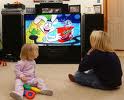It has been reported that among children of school age, 50 percent read 4 minutes a day or less; 30 percent read 2 minutes a day or less and 10 percent read nothing.
The same group of children watches an average of 130 minutes of television per day.
This report is alarming despite specialist conjectures that children become good, insightful, analytical readers only by lots of practice with reading. And evidently, it seems that this culture doesn’t read.
Although sales of children’s books are growing to affluent parents who want to give their children every educational advantage, no one is really sure who is actually reading the books.
The state of literacy in the developing countries has declined steadily through the years and the same is true even with the developed countries like the US. Newspapers scream daily about declining literacy rate.
A report concludes that most 17 years old Americans are poorly prepared to handle job requiring technical skills and that 7 percent could handle college level science courses.
For a long time now, many television shows for children have popularized the erroneous belief that it is appropriate for most preschoolers to learn to read.
Worse, many parents and teachers readily accept this theory. Recent studies, however, show that it is in fact a serious mistake to push reading skills at children before they have completed certain development tasks that will give them something to read about and the ability to understand it when they do!
More so, it is not also good for children to start reading with structure lessons just like what most television shows attempt to do.
To become good readers, children first need to acquire the language furnishings that will make the brain a comfortable place for real literacy to dwell.
During the early years children can learn best through active, hands on experience such as (playing, building, exploring and talking); imaginative social play and listening to stories told by parents or model figures.
Based on research, when poor readers were asked what reading is all about, they tend to answer “sounding out the words,” while good readers say “understanding what the words and sentences mean”.
This shows how poor readers are missing the whole point of reading. And this somehow affects their enthusiasm for this activity. Children must have a good foundation for good language development before they can get the meaning.
